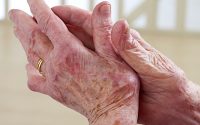Heart attack: A sudden onslaught of sweating for no apparent reason is a warning sign
What's the difference between a heart attack and cardiac arrest?
We use your sign-up to provide content in ways you’ve consented to and to improve our understanding of you. This may include adverts from us and 3rd parties based on our understanding. You can unsubscribe at any time. More info
During a heart attack, tissue in your heart muscle dies due to lack of blood flow through your heart’s arteries. A heart attack occurs when the flow of blood to the heart is blocked. The ordeal is said to last around ten to fifteen minutes and could be life threatening. Being aware of potentially early warning signs could also be a matter of life or death.
Sweating or feeling clammy could be caused by heart disease, warned the British Heart Foundation.
It’s very normal to feel sweaty after doing exercise, or on a particularly hot day.
But suddenly sweating for no obvious reason may be a sign of a heart attack.
It’s more likely to be caused by heart disease if the sweating is accompanied by a sudden pain in your chest.
READ MORE: Gordon Ramsay health: Chef ‘scared’ to slow down after diagnosis he didn’t ‘want to hear’

Pumping blood through clogged arteries takes a lot more effort from the heart, so the body sweats more to try to keep the body temperature down during this added exertion.
Night sweats are also a common warning sign for women who may be experiencing heart problems.
Both of these conditions can often be overlooked; however, it could be a way the body is warning that a heart attack may ensue.
Sweating more than usual especially if you aren’t exercising or being active could be an early warning sign of heart problems.
Pumping blood through clogged arteries takes more effort from your heart, so your body sweats more to try to keep your body temperature down during the extra exertion.
Excessive sweating, or hyperhidrosis, can also be a warning sign of thyroid problems, diabetes or infection.
Excessive sweating is also more common in people who are overweight or out of shape.

Other lesser-known signs of a heart attack include:
- Pain radiating into the jaw, neck, or shoulder
- Breaking out in a cold sweat
- Nausea or vomiting
- Rapid onset of intense fatigue
- Light-headedness or dizziness
- Sudden feelings of anxiety or doom
- Severe indigestion or heartburn.
Timely treatment is critical when it comes to heart attack.
Without it, the blocked heart muscle is at risk for permanent damage the longer blood flow remains cut off.
This is why knowing the signs of a heart attack and taking them seriously is so important.
Any combination of these symptoms should be taken seriously.
Source: Read Full Article


